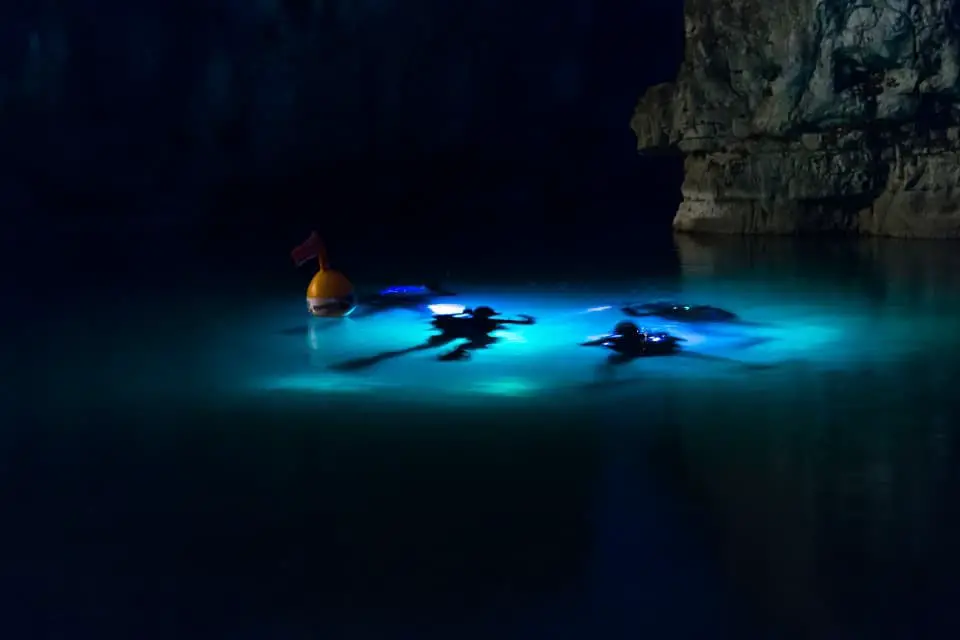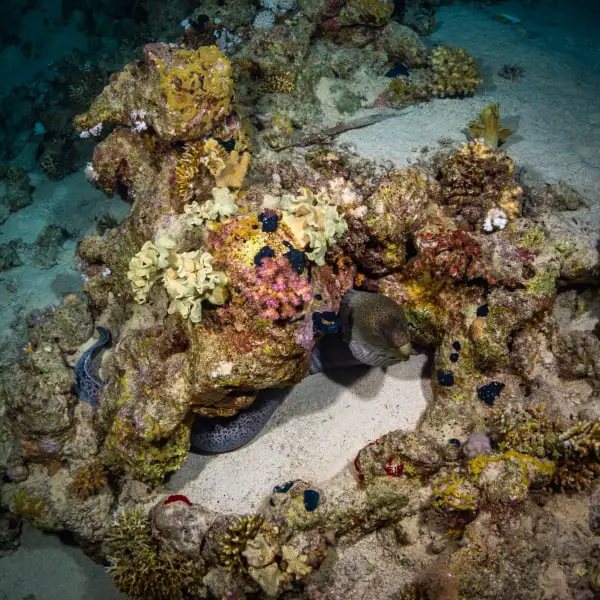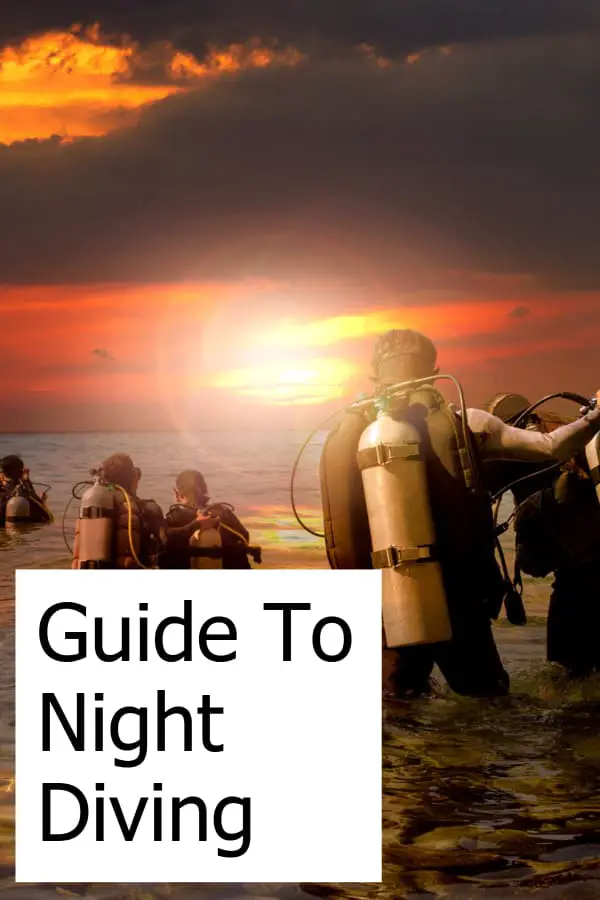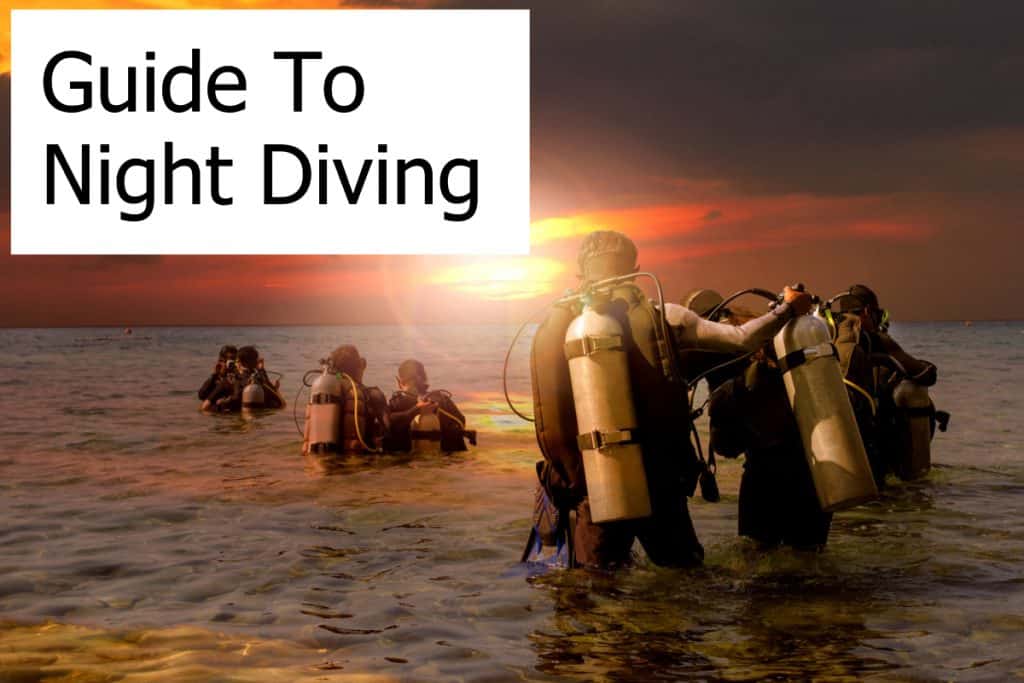An In-Depth Guide To Night Diving
Night diving is a great way to get out and explore the world in an entirely new light. That being said, it does come with its own risks, demands, and methods. You certainly want to be fully prepared for your night diving adventure before dipping your toes in the water.
It helps if you already have to experience scuba diving during daylight hours, but that’s not exactly mandatory. Following is an in-depth guide to night diving, including some equipment requirements, preparation techniques, and important considerations.
If the sense of wonder and adventure is what attracted you to diving, then you’ll likely love night diving even more. It’s a familiar activity and a brand new adventure at the same time. You’ll leave the water with some amazing photos and some stories you’ll be telling for years to come.
A Brief Introduction To Night Diving
Surprisingly, there is a large number of people who have never heard of night diving. Or perhaps they don’t realize it’s a widely popular activity and not just the same thing during a different time of day. As the name implies, night diving is all about scuba diving at night. By diving at night the entire environment and atmosphere are different. There’s often a different variety of animals present as well.
Most people who begin night diving already have plenty of experience diving during the day. Having that previous experience and confidence does help during the nighttime hours when the light is scarce and tension is high. In many cases, those divers have spent countless hours at a certain reef and know how to navigate it backward and forwards.
Even though a diver may be extremely familiar with a particular reef, they soon learn that it is completely different during the nighttime hours. The colors are different, the animals are different, and the emotions are different. By diving at night they convert that familiar old reef into a new and exciting adventure.
It’s not just the absence of sunlight that makes the experience different. Rather, many forms of marine life behave completely differently at night time. For example, even the coral itself will behave differently. Coral polyps open wide at night time to feed on nutrients passing through the water. The polyps are rarely open during the day unless the current is unusually strong. Opened polyps introduce a variety of new colors and shapes into a scene that you may have seen a dozen times before.
The lack of sunlight also has a significant impact on the noticeable colors as you dive. During the day, sunlight begins to be filtered away at around thirty feet. The further you dive the more light you lose and the more certain colors begin to fade. Red is the first of the colors to fade away entirely.
At night; however, the only source of light is coming from you. You are often much closer to objects meaning that the light isn’t filtered away before hitting the marine life. Therefore, you can see everything in their true colors. You may see splashes of color that you never knew were there. Colors that were simply impossible to see under the filtered sunlight.
Diving during the day is already an incredible experience. But if you’re looking to expand your diving activities with something new, exciting, and a little bit scary, then night diving might be for you.

Recommended Equipment for Night Diving
For the most part, you will use a lot of the same equipment you use for diving during the day. There are a few exceptions and recommendations that are specific to diving at night. You have to consider the obvious change in lighting as well as potential changes in water temperature.
Three Separate Lights
The most important piece of equipment you’ll need to purchase for your dives is the torch. This is your only source of light in the dark waters. You will actually want to purchase two torches that you carry on each dive. One serves as a backup torch if the first should fail. Both, the primary and backup torch, need to be fairly powerful. They should emit enough light to help you safely navigate the waters.
It’s a good idea to invest in torches that use rechargeable batteries. You can easily burn through a lot of battery power if you find yourself diving every night during a holiday. If your torches ran on standard batteries, then you could wind up paying quite a lot just for batteries alone. Rechargeable batteries are more cost-effective and better for the environment.
There are some organizations that recommend using standard batteries for your backup torch. They claim that standard batteries are more predictable than rechargeable options. This is true to some degree but shouldn’t be considered mandatory. Regardless, you should still invest in rechargeable batteries for the main torch.
The third light you’ll purchase is used to mark your exit point. Many divers use a strobe light when they are diving from a boat. The light is attached to the boat and helps you find your exit point in dark conditions. This should be a powerful light as well. The last thing you want is to wind up lost while diving in the middle of the night.
It can be a bit more complicated if you’re diving from the shore. You may actually need two light sources instead of just one. You can then line up the lights visually to help point you back towards the shore – Do you need a purge mask for your night dive?

Choosing The Right Camera
One of the best parts of night diving is taking a bunch of amazing pictures. The photography available at night is unlike anything you can experience during the day. You’ll see marine life that is normally dormant or hidden during the day. The colors are more vibrant and everything looks more impressive. Naturally, you’ll want to find a great camera specifically for taking pictures at night.
Cameras designed for nighttime diving generally come with additional lights. The internal flash from the camera isn’t strong enough to illuminate the subject matter. Your torch will provide a great deal of ambient light, but an additional strobe light is usually needed to get the best shots.
It’s up to you whether or not you want to take the best possible camera gear when night diving. It may be a bit too much to handle if you’re still warming up to the idea of night diving in general. You can always try night diving with a simple camera at first to see if you really like it. Once you’ve decided you’re ready, then you can invest in a better camera rig to capture some of those amazing moments.
Preparing for Your First Night Dive
There are several routes of preparation you can take for your first night dive. Your first step should be to get some experience diving during the daytime. Sure, it may not sound quite as fun, but it’s important that you understand the fundamentals of diving during the day before jumping into the water at night. Night diving is like a more complicated version of daytime diving.
Perhaps the best method of preparation is to enroll in a training course. Many of the same organizations that offer daytime diving courses also offer training courses and scuba certifications for nighttime diving. You may be familiar with some of the agencies, including the SDI, SSI, and PADI. Each of these offers training courses for night diving that will teach you what to bring, how to breathe properly, how to communicate, and how to navigate the waters at night time. Those courses also have the advantage of letting you experience your first few night dives with a trained professional.
For many divers, mental preparation is important as well. They may love the idea of diving at night, but actually bringing themselves to dive into the dark water can be a bit intimidating and stressful. There are many divers who decide at the last moment they can’t handle it. You can avoid this by preparing yourself mentally for what’s to come.
Training and experience help with mental preparation to some degree as well. If you already have experience night diving with a trained professional, then you will feel more relaxed and confident when it’s time to do it by yourself. Likewise, if you’ve dived in that area during the day, then you’ll feel more prepared during the night.
It’s also a good idea to fully prepare with a pre-dive briefing with your fellow divers. Make sure that everyone understands what forms of communication will be used and what certain signals mean. You want everyone to be on the same page when it comes to communication.
Night Diving Considerations
Most agree that the best time to start a night dive is just as the sun is setting. You can fully prepare on the boat while the sun is still in the sky and dive into the water just as it is fading over the horizon. You’ll get to witness firsthand many of the changes that take place underwater as the sun goes down. And there are quite a few of those changes, both with plant life and with the animals.
Use your torch as a tool to attract marine life to certain areas. It’s a great way to see what all is around you. It’s also great for setting up photo opportunities. For example, if you point your torch up toward the surface of the water it will attract several small fish. Those small fish then attract the larger fish to the area. If you were to point the light down toward the bottom, then it would more likely attract a squid or octopus.
Night waters are filled with amazing creatures that are usually hidden during the day. Or there are some like the plankton that is there during the day, but you just can’t see them. At night, you will be able to notice the bio-luminescent effect of the plankton. As the plankton comes into contact with your body they will emit a bright glow for a moment. And if you wave your arms you can see hundreds of them illuminate all around you. It’s a visually impressive spectacle that you’ll want to experience your first time in the water at night.
Some of the marine life you are likely to encounter at night would be intimidating during the day but are more so during the night. Large sharks and manta rays that weigh more than a ton are known to become more active during the night. It can create some amazing memories as well as photo opportunities if you are willing to get close enough to take the picture.
Is Night Diving For You?
If the sense of wonder and adventure is what attracted you to diving, then you’ll likely love night diving even more. It’s a familiar activity and a brand new adventure at the same time. You’ll leave the water with some amazing photos and some stories you’ll be telling for years to come.


